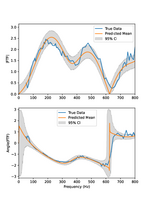FRESCO - Flame Response Scaling in Combustion Dynamics
We develop universal scaling rules for flame responses in combustion systems by combining physics-based analysis and data-driven modeling.
Accurately predicting the thermoacoustic behavior of combustion systems is a key challenge in the development of gas turbines and aero engines. Flame transfer functions (FTFs) and finite impulse responses (FIRs) are central tools in this context—they describe how a flame responds to acoustic perturbations in both the frequency and time domain.
This project focuses on identifying scaling rules for these flame responses, enabling transferability between different combustion setups and operating conditions. Such rules are essential to reduce the cost and complexity of thermoacoustic modeling, especially in early design stages.
Our research explores how flame responses vary with:
- Geometric changes (e.g., burner length, diameter, confinement)
- Swirl intensity and flow field structure
- Chemical composition and thermochemical states
To establish robust and generalizable scaling rules, we combine two complementary methodological approaches:
- Physically motivated scaling: We analyze the underlying physical mechanisms governing the flame response—such as convective time delays and heat release fluctuation dynamics—to derive interpretable, mechanistic scaling relations.
- Data-driven modeling: We apply advanced statistical learning techniques, including Gaussian Processes and Neural Networks, to extract patterns from large simulation datasets and identify dominant non-dimensional parameters.
The goal is to bridge the gap between phenomenological insight and predictive modeling, contributing to the development of universal response laws for practical combustion systems.
